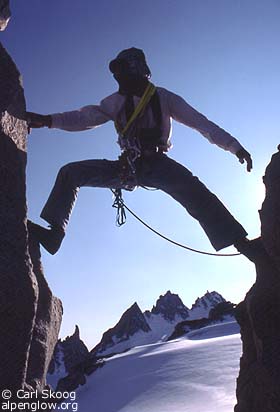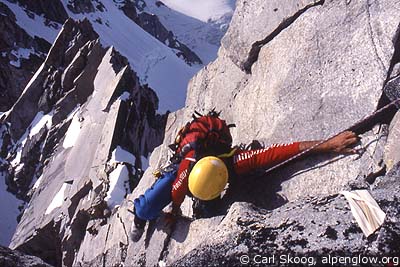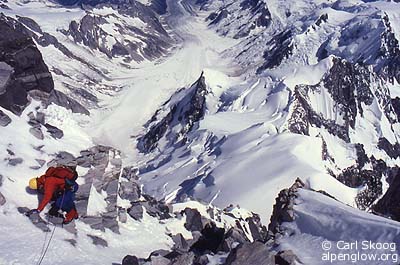|
 Climbing:
an arbitrary game, played for keeps. Not so serious, yet very
serious. For real, but not quite real. A self-imposed set of
rules, restrictions, and personal roadblocks thrown up on a road
to nowhere, that is to say anywhere and everywhere: Start here,
at the base of this rock, this slab, this crack--the infamous
Point A--and finish up there, on top of that boulder, that ledge,
that peak--the mythical Point B.
Climbing:
an arbitrary game, played for keeps. Not so serious, yet very
serious. For real, but not quite real. A self-imposed set of
rules, restrictions, and personal roadblocks thrown up on a road
to nowhere, that is to say anywhere and everywhere: Start here,
at the base of this rock, this slab, this crack--the infamous
Point A--and finish up there, on top of that boulder, that ledge,
that peak--the mythical Point B.
Call it a route, call it a climb, call it a game, because you and your friends made up the rules and (mostly) obeyed them, because how you got there was more important than just getting there, because really we're only playing (aren't we?), not climbing for something, or to something, or with something else in mind. Instead of pursuing goals too easily reached, we were...what? Embracing the now? The now or never? Measuring meaning by a finely tuned balance of natural and self-imposed challenges--the harder the climb and the less likely our success, the fewer rules we needed to preserve that inner adrenaline rush of uncertainty, the doubt essential to adventure. And vice versa: The easier the goal, the more radical and restrictive were the rules we'd choose. That's more or less the way I put it when I wrote "Games Climbers Play" some twenty-odd years ago, a kind of pre-postmodern analysis of climbing as an intense, elegant, arbitrary game, an analysis that has stood up pretty well over time. A nice idea, more or less true. Seems I was right. And also wrong. Climbing, it has slowly dawned on me, is often both less and more than just a game.
Less what? Well, a hell of a lot less pure, for one thing. The beauty, it always seemed to me, of treating climbing as a game was the delicious pointlessness of it all, the arbitrary commitment of time, energy, strength, talent, cunning, and courage to a task that really didn't need to be done. The act of climbing was its own definition, its own reason and motivation, a self-justifying feedback loop that never looked outside itself to society for validation. A rather "sixties" idea, it now strikes me: the sense that when you climbed you stopped, literally, everything else. Because if the climb was demanding enough, if you'd understood the game and sharpened the rules to that perfect pitch, then you wouldn't have room in your consciousness for anything else. Your universe would both shrink and expand to the next hold, the next few feet of face, the next phase of this empty-in-advance safe you were cracking, hidden combination by hidden combination, for its own sake, empty of everything but the challenge accepted, the problem solved. Yeah, sure, sometimes it worked that way, and often it still does. Sometimes we do leave the shit behind; the world out there gets less and less real as the rock or the ice gets more and more real. Sometimes it all drops away--school and jobs and careers and greed and ambition and relations and your sick parents, your plans for next weekend, those unpaid bills, the unchanged oil in the pickup--it all drops away and disappears before you're ten feet off the deck. But sometimes, of course, it doesn't work out like that. Sometimes the rest of your life follows you up the crag like an endless haul line clipped to your harness, heavier and heavier each pitch. You know what I mean. One thing seems certain, climbing isn't--and never was--as pure and arbitrary a game as the simplified view I staked out in "Games Climbers Play."
Climbing, most of us agree, is a creative act. But what climbers create are not just routes, not just aesthetic statements, dotted lines up cliffs, articles in Climbing or Mountain, or footnotes in a guidebook. Climbers are busy creating their own personas and personalities, their own lives, as they climb. And when the climb is over, those lives go on, go forward: a one-way trip with no possibility of backtracking to rub out something that no longer feels quite right, looks quite right. How you climb today very soon becomes how you have climbed, which, just as rapidly, becomes who you are. In a recent Woody Allen film, a character says, "The sum of the choices you make is who you are." Not comedy this time, but fact. The fact I'm leading up to is this: Many, maybe most of the choices climbers make (and certainly their most important choices) don't concern rock and ice and holds and dynamic moves and rope management and protection; they concern other people--climbing partners, friends, family, the community at large. Even the solo climber has made some major statements about other people, and is acting them out. These are the decisions that stick with you, define you, have long and lasting consequences. Climbing games, it turns out, always involve more than one player. Two (extreme) examples: A few years ago, the cover of a Diamond-C equipment catalog carried a chilling blurb as a sort of endorsement for ice tools: It was the text of a postcard from a Japanese climber describing a solo summit dash on K2. He told of racing to the summit while another member of the party, a "young" guy not even given the dignity of a name, tries in vain to catch up and falls to his death. No regrets, no sorrow, no human connection to a fellow member of the expedition, almost no notice except that the fatal accident gave the summit day more drama. A young alpine-stud on the way up: fame, sponsorship and big-time endorsements looming large ahead. Contrast this with another mountain drama. A French alpinist friend of mine from the 1960s and his exhausted partner were pinned down by bad weather near the summit of Mont Blanc after a winter ascent on a big south-face route. Bad judgment no doubt, over-extended and probably under-prepared. My friend, "petit Claude," found himself stuck in one of those situations where decisions really do define a whole life. He could abandon his exhausted and disoriented buddy near the summit and descend to safe haven at the Vallot Hut; he would certainly make it, his partner would certainly die. Or he could stay with him, keep him warm, take care of him as best he could and maybe, just maybe, the weather would break and they'd be rescued. A long shot that didn't work. They both died. I (and a lot of other people) lost a good friend to that storm. But thinking about it, it seems to me that petit Claude's life was one of those rare ones that's good to the end. His choice on top of Mont Blanc confirmed a lot about his character, all our reasons for loving and admiring him.
Is this an unfair comparison? To say that one climber died affirming life (a failure that was really a success), while another made a hot climb while turning his back on life (a success that was an appalling and stupid failure)? I don't think so. My point is that while climbing games themselves are both arbitrary and asocial (there simply is no real reason to climb other than "because..."), climbers also function in a broader context, in a world shared with others--a world where we define ourselves by the way our private games, ambitions, and dreams interact with those of other people. Climbers escape many but not all judgments. The meaning of a climb, any climb, is always twofold: There is the meaning we draw directly from challenge, movement, and skill, but also a meaning that depends on how (or whether) the climber's actions will affect others. The same climb, for example, can be both very hard and very commercial. A climb can be admirable in one sense and contemptible in another. It can sometimes, in fact, be absolutely value-neutral to anyone but the climber, yet I'd say that's rather rare. It is hardly surprising that climbers, instead of climbing out of the complex web of daily life into something like solitude, discover that the radical nature of their choices while climbing lead to radical consequences in other people's lives as well as their own. Climbing is no exit from the dense tangled ecology of intentions and results we also call life. The idea of climbing games has proved a strong one, but not
strong enough to block out the larger context or consequences of
climbing. I wish I could just assert that, in addition to being
a fascinating complex of games, alpinism is also a form of
humanism. Today, unfortunately, it's not that clear.
|



